by Julie Pigott Dillard | Feb 8, 2019
 Well’s FRM was one of my favorite places to go with my dad when I was a little girl…especially when baby chicks arrived. With spring right around the corner, local feed stores will be getting shipments of baby chicks soon. Have you thought about raising baby chicks but are unsure how to? Then join us in the 4-H Chick Chain project!
Well’s FRM was one of my favorite places to go with my dad when I was a little girl…especially when baby chicks arrived. With spring right around the corner, local feed stores will be getting shipments of baby chicks soon. Have you thought about raising baby chicks but are unsure how to? Then join us in the 4-H Chick Chain project!
4-H Chick Chain teaches youth how to raise baby chicks to laying age using science-based best practices. At the end of the project, youth compete in a showmanship and skill-a-thon contest to test their knowledge and also exhibit their birds for judging and awards.
HOW DOES THE 4-H CHICK CHAIN PROJECT WORK?
You’ll purchase or hatch your own chicks during the month of March 2019. The number you choose to purchase or hatch is up to you, but we recommend that you begin with at least three chicks.
Chicks must be from the following breeds:
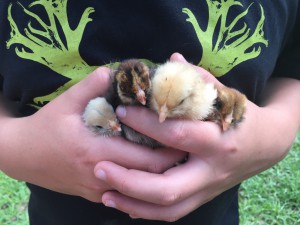
Chicken breeds have unique needs and personalities. Do some research before you choose your breed.
- Australorp
- Barred Rock
- Brahma
- Jersey Giant
- Leghorn
- Orpington
- Rhode Island Red
- Silky
- Welsummer
- Wyandotte
The 4-H Chick Chain is designed to take you step-by-step through the process of raising your birds to healthy laying age.
There is an orientation webinar and a hands-on workshop to get you ready for the show you’ll attend during the summer. Your 4-H Agent or project volunteer can also make a home visit to check up on your progress.
HOW DO I SIGN UP?
4-H Chick Chain is open to all youth ages 5-18 who are enrolled or enroll as new members in 4-H. Enroll now.
Registration opens March 1 and closes March 31 in 4honline.
Families can share a project, but each youth should be individually registered.
Members who participated in the 2018 4-H Chick Chain project can register as a returning production project.
REGISTRATION FEES:
- 2019 New Project: $20
- 2018 Returning Production Project: $10
To learn all about the project, read the 2019 4-H Chick Chain Youth Project Guide.
If you’re an adult with a love of poultry that you’d like to share with others, consider becoming a 4-H poultry project leader. Our programs include 4-H Embryology in the Classroom, 4-H Chick Chain, and 4-H livestock clubs. Visit http://florida4h.org/volunteers to find out more. To learn more about 4-H in your county, contact your local UF/IFAS Extension Office.
Still have questions about 4-H Chick Chain? Contact project chair – Julie P. Dillard – juliepd@ufl.edu or call 850.638.6180.
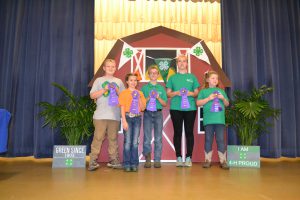
Best of Breed winners from the 2018 4-H Chick Chain.
by Julie Pigott Dillard | Jan 25, 2019
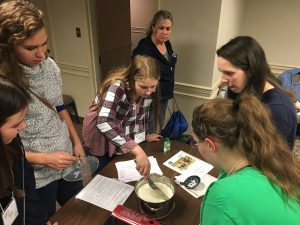
Can making mozzarella cheese really help you find your future career?
As an Extension Agent, I’ve attended numerous 4-H events through the years. Recently, I co-taught workshop at the National Youth Summit on Agri-Science at the National 4-H Center. Along with 4-H Dairy & Poultry Science Specialist, Chris Decubellis, FCS Agent, Jill Breslawski, and Dairy Regional Special Agent, Coleen Larson, we instructed 53 teens from 23 states in our two workshops!
Careers and Cheese…There’s a Connection!
Teens were introduced to agri-science during the keynote address by Mr. Ted McKinney, the Under Secretary of Agriculture for Trade and Foreign Agriculture Affairs. Summit sessions included introductions to career options and agri-science hands-on workshops. The questions and levels of interest were refreshing. I was most impressed with a young lady who expressed hesitation about attending the summit – she thought it would be solely farm-based topics. After she participated in our Exploring Dairy Science workshop (incorporating a presentation on a wide variety of careers available in the Dairy Science field and a hands-on activity making mozzarella cheese), she inquired about my career. As we discussed the vast realm of degrees one could hold to work as an Extension Agent and the wide variety of jobs available in Extension, she then shared she had found some direction for her future study in college when she entered as a college freshman in the fall of 2020.
Look Past the Title
Witnessing teens discover fields of study that meet their interests is the best reward! These type of 4-H youth opportunities help teens in so many ways. I encourage all 4-Hers to look past an event title, explore the event opportunities and keep an open mind. It could be a life changing experience!
For more information on 4-H in your county as well as state and national level events, contact your local UF/IFAS Extension office. Learn more about the Florida 4-H Dairy project.
This article was written by Marie Arick, UF/IFAS Extension Liberty County, County Extension Director & Family/Consumer Sciences Agent.
by Jena Gilmore | Jan 18, 2019
While this year’s hunting season is winding up, it’s never too early to think about getting ready for next year. Whether it’s deer, squirrel, ducks, dove or turkey, there are important hunting rules and guidelines both youth and adults must follow. Organizations like the Florida Fish and Wildlife Conservation Commission (FWC) and your local UF/IFAS Extension Office provide programs to keep you on target each hunting season!
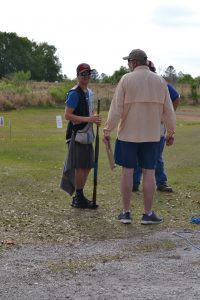
Safety is a key element of any shooting sport.
SAFETY FIRST
Each hunter must take some version of the Hunters Safety Education course. Anyone born on or after June 1, 1975, and 16 years or older, must pass a hunter safety course before a hunting license can be purchased. There are four options to complete this requirement:
- Traditional Course and Skills Day
– Face-to-face instructor led course
– Hands-on skill day – register here
- Online Course and Skills Day (two part process)
– Complete one of the online courses
– Hands on skill day – register here
- Florida Virtual School Outdoor Education
– FREE to Florida students in grades 9-12 or ages 12-18
– Apply here
– Earn 0.5 credit for high school
- Firearms Safety Certification and Online Course
– Adults only
– Must have completed previous firearms training
– Must complete one of the online classes in Option 2
– Follow procedures outlined in the Application for Hunter Safety Certification
If you’re using the Hunter Safety Mentoring Exemption and hunting under the supervision of a qualified hunter, you are exempt from this requirement.
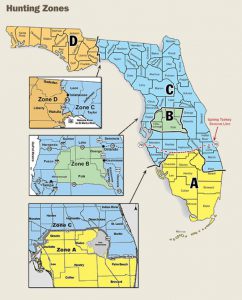
Our district covers Zone D – Escambia to Gadsden/Wakulla & Zone C – Leon & Jefferson. Map courtesy of FWC.
Find Your Zone
Hunters should strive to be good stewards of Florida’s resources to keep this sport a tradition for generations to come. Take the time to determine what hunting zone you live in. Your zone determines your hunting season – meaning the appropriate time you can collect specific game in that area. You can find the Florida Hunting Zones Map here: http://myfwc.com/hunting/season-dates/zone-map/. Next, check the annually updated hunting season dates and bag limits related to your zone to stay in compliance with FWC regulations: http://myfwc.com/hunting/season-dates.
4-H Shooting Sports
Find your local UF/IFAS Extension Office and determine if there is a 4-H Shooting Sports program in your county. Participation in a 4-H Shooting Sport program provides year-round opportunities for youth to not only practice their discipline but also to explore other disciplines in a safe, inclusive, environment with 4-H volunteers/mentors!
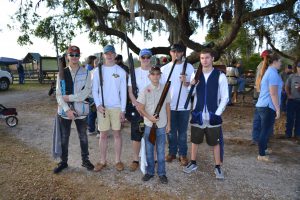
4-H grows important life skills like responsibility, goal setting and teamwork in youth through shooting sports.
4-H Shooting Sports includes air rifle, small bore rifle, archery, shotgun, muzzleloading and hunting and develops important life skills in a safe and educational environment. Shooting sports day camps are popular during the summer, so ask you 4-H Agent if one will be scheduled for you county.
Attention Volunteers!
Would you like to become become 4-H Level 1 Certified to coach and teach youth shooting sports? If you are already enrolled as a 4-H volunteer, log in to your profile and register for the February 16th hands-on training in shotgun and archery. You’ll also complete five online learning modules as part of your training. If you’re new to 4-H, enroll at florida.4honline.com, and let your county 4-H Agent know that you are interested in teaching shooting sports.
Explore the links below to see how you and your youth can get involved in 4-H and stay up to date on the hunting regulations for your area:
by amgranger | Dec 7, 2018
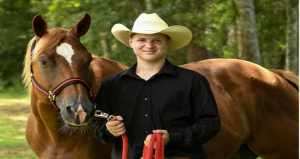
Photo Credit: Melissa Loper
Warren Loper is an award-winning member of the Boots and Buckles 4-H Horse Club. Earlier this year, the Jackson County 4-H’er won awards at both the regional and state 4-H horse shows. What makes Warren unique is that he is also hearing impaired. But Warren is very much a “people person” and doesn’t like feeling different from anyone else. His mother, Melissa Loper, recently talked to me about his 4-H experience and how it has played a role in helping Warren build confidence and achieve success regardless of his challenge.
At two weeks old, Warren was diagnosed as being completely deaf due to improper functioning hair follicles in the Cochlea. At 15 months of age, he received a Cochlear implant that was activated at 18 months of age.
Melissa said Warren didn’t like the Cochlear implant at first because it allowed for all sounds to be heard at once. He had to learn how to drown out background sounds. The implant had to be turned down completely and then slowly raised to a level that was tolerable. His ability to handle the implant increased as he got older. Melissa says there are times when Warren would rather not be able to hear.
When asked what role 4-H has played in helping Warren build confidence and feel included, Melissa shared the following:
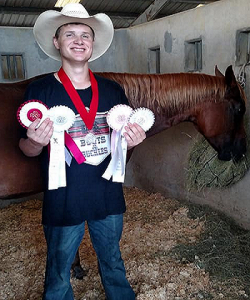
Photo Credit: Julie Hughes
“Being involved in the 4-H Horse Project has helped him so much. He has come out of his shell. His club leader, Lindsay Kiefer, has spent hours working with Warren and is so patient with him. He lives for helping other children, and it makes him feel important. One key thing is that no one on our team treats him like he is different than they are. As a mother, that is so important to me. Seeing the improvements he has made in his social skills and seeing him develop into an amazing rider warms my heart.”
One of the key components of 4-H is developing life skills and providing a safe and inclusive environment for all youth regardless of their physical or mental conditions. 4-H allows all youth the opportunity to explore their areas of interest. For Warren, the 4-H horse project allows him to learn the valuable life skills that come from raising and showing a horse and also allows him to exhibit mastery of learned riding skills in competitive events.
FUN FACTS…
Youth involved in the 4-H Horse Project learn more than just the science behind feeding and caring for a horse, and how to properly ride. Youth also compete in contests such as horse bowl, demonstrations, public speaking and art. Youth participating in this projects use their horse as a tool to increase their knowledge and enhance their life skills making them more productive young people. To find out more about the horse project in your county, contact your local UF/IFAS Extension office.
by Julie Pigott Dillard | Oct 1, 2018
2018 4-H Chick Chain
The final link in the 4-H Chick Chain project closed on Saturday as 4-H members from the northwest extension district participated in a showmanship and skill-a-thon contest and brought their best birds for judging.
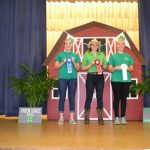
Skill-a-Thon Seniors
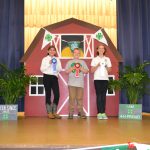
Skill-a-Thon Juniors
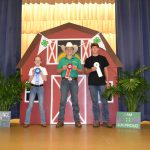
Skill-a-Thon Intermediates
Showmanship – This tests youth on how knowledgeable they are about the care, nutrition and health of their project and how they handle their bird.
Junior Showmanship – 1st Taylor Anderson,
2nd Tucker Padgett, 3rd Emma Weeks
Intermediate Showmanship – 1st Catherine Proud, 2nd David Marr, 3rd Brodie Price
Senior Showmanship – 1st Kearsten Dalton, 2nd Hailey Dalton, 3rd Brayden Price

Best of Breed winners
Exhibition – How the youth fed and cared for their projects was also put to the test as the birds were judged on breed characteristics and production potential.
Best of Breed Barred Rock – JaceBryan Broxson
Best of Breed Buff Orpington – Ethan Thornburry
Best of Breed Cochin – Brooks Marr
Best of Breed Cuckoo Maran – Kearsten Dalton
Best of Breed Speckled Sussex – Emma Fore
Best of Breed White Leghorn – Bella Price
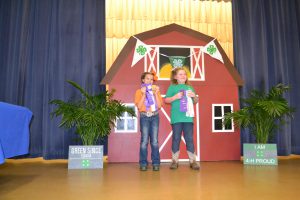
Overall Grand Champion and Reserve Champion
Grand and Reserve Champions
From the Best of Breed winners, an overall grand champion and reserve champion were named.
Overall Reserve Champion – Emma Fore
Overall Grand Champion – Bella Price
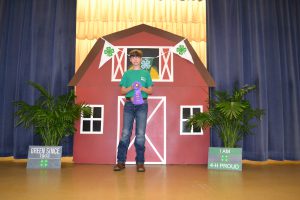
Best of Show Production Bird
Best of Show Production
Youth who have participated in the 4-H Chick Chain in 2016 and 2017 also brought their best production birds to be judged. Birds were judged on production elements.
Best of Show Production – Brayden Price
Skill-A-Thon

Skill-a-Thon Juniors

Skill-a-Thon Intermediates

Skill-a-Thon Seniors
Skill-a-thon is a hands-on way to test general knowledge of poultry including identifying breeds, setting up a brooder, reading a feed label, identifying common poultry diseases and identifying parts of the chicken.
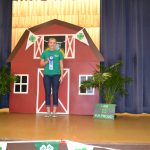
Photography Top Senior
Photography
Our newest category youth this year included photography. We had several entries featuring the birds at all ages of the project.
Best of Show Photography Senior – Hailey Dalton
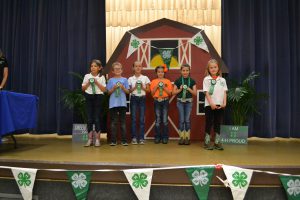
Cloverbud Exhibitors
Cloverbuds
Our Cloverbud 4-H members are an important part of our project. Even though they are non-competing, they participated in every aspect of the show, skill-a-thon and project books.
Be sure to like the 4-H in the Panhandle Facebook page to get the latest information on when registration for the 2019 4-H Chick Chain project will open. There’s also a comprehensive list of all of the award winners from this year!
Thanks for participating
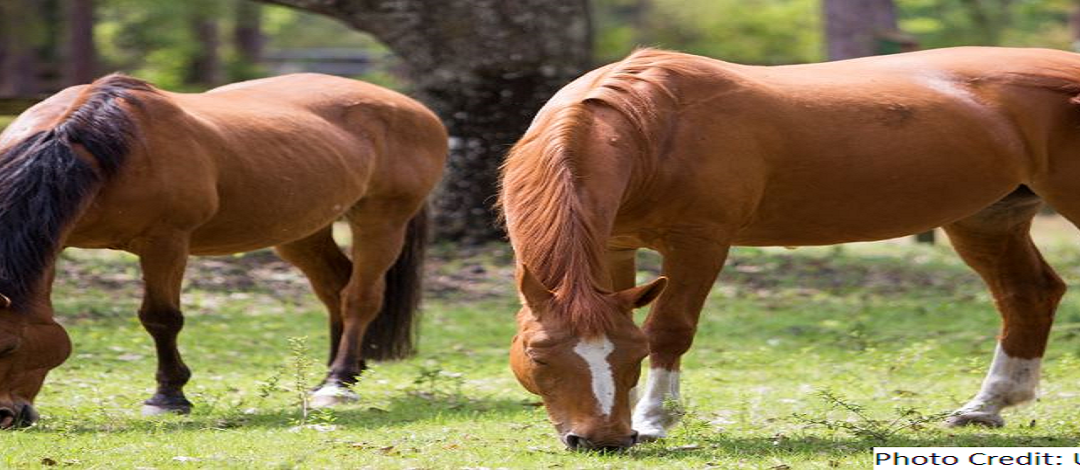
by amgranger | Sep 28, 2018
Be Prepared and Have a Plan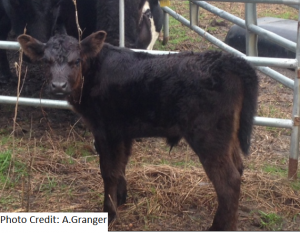
This time last year, we were helping our 4-H friends all over Florida recover from Hurricane Irma. Hurricane season has been quiet in Florida so far, but that doesn’t mean we need to let our guard down – we still have two more months of hurricane season.
So,what would you do if you didn’t have electricity? How will you care for your 4-H project animals? Do you have an evacuation plan? Answers to these questions become major issues when dealing with disasters.
Disasters can be natural/weather-related, man-made or accidental. Regardless of the type, it’s important to be prepared and have a plan for you and your animals.
Plan for Your Animal’s Safety
Whether you evacuate or shelter in place, here are a few considerations:
- Be ready to leave once the evacuation is ordered.
- Evacuate animals as soon as possible.
- Your project animal won’t be able to stay with you in a shelter like a dog or a can.
- Know where safe livestock facilities are in your area or along your evacuation route.
- If you can’t evacuate, decide if you’re keeping animals confined to a barn or turning them out into pastures.
- Barn confinement may become dangerous and take away the animal’s ability to protect themselves.
- Pastures should be at least one acre in size with no potential hazards (barbed wire, power-lines, polls or items that can be picked up by the wind).
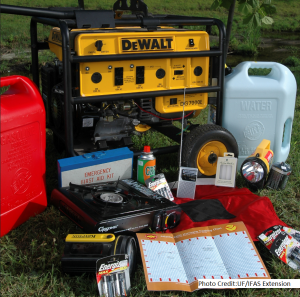 Disaster Preparedness for Livestock – Why Livestock Owners Need to Be Prepared
Disaster Preparedness for Livestock – Why Livestock Owners Need to Be Prepared
The Florida Department of Agriculture and Consumer Services (FDACS) has some suggested guidelines about preparing livestock and horses for disasters:
- Check with your local humane organization, extension office or local emergency management agency to read about your county disaster response plans.
- Determine safe evacuation routes for trailers and livestock.
- Prepare a Farm Disaster Kit and Basic First-Aid Kit. Remember, supplies during or after the disaster may be in short supply, or roadways may be blocked. Keep kits up-to-date, keep them on-site and in your vehicle.
- A vaccination and test records (Coggins, health certificates, etc.)
- A list of all animals, where they are located on the farm and feeding instructions/records
- Sanitation items, cell phone, flashlights, portable radios and batteries.
- Have feed, water, handling equipment, tools, veterinary supplies and a generator (with fuel) on hand if possible.
- Make a list of emergency numbers – veterinarian, neighbors, state veterinarian, animal shelter, county extension office,local volunteer organizations and someone outside of the disaster area.
- Make sure you have proof of animal ownership. Have temporary ID supplies on hand like permanent markers and plastic bands that are safe, durable and visible. ID should include your name, address, and telephone number.
- Poultry need access to high areas to perch if you’re in an area susceptible to flooding. Provide access to clean water and food.
- Remove barbed wire or other fencing so animals can move to areas of safety during flooding or high winds.
- Store water in large containers (enough for a week) suck as troughs, swimming pools or boats
- Secure items that might be picked up and thrown by the wind like pieces of metal, troughs, tanks or trailers.
- Ensure there is safe shelter, fencing or pens.
- Keep animals in groups they’re used to where they are securely contained and protected from the elements.
Resources:
For more information about 4-H, contact your local UF/IFAS County Extension Office. If you are an adult or teen with skills or knowledge you’d like to share, ask about becoming a 4-H volunteer!
 Well’s FRM was one of my favorite places to go with my dad when I was a little girl…especially when baby chicks arrived. With spring right around the corner, local feed stores will be getting shipments of baby chicks soon. Have you thought about raising baby chicks but are unsure how to? Then join us in the 4-H Chick Chain project!
Well’s FRM was one of my favorite places to go with my dad when I was a little girl…especially when baby chicks arrived. With spring right around the corner, local feed stores will be getting shipments of baby chicks soon. Have you thought about raising baby chicks but are unsure how to? Then join us in the 4-H Chick Chain project!

















